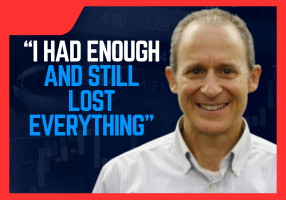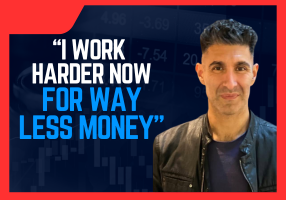
Our work is based on a pretty simple premise: humans have a capacity for telling, listening to and responding to stories.
Sometimes – most of the time – our work criticizes a Nudging oligarchy in politics, media and business that weaponizes these stories to influence our behavior in ways that benefit their personal aims. And yes, sometimes we celebrate the way in which story-telling brings us closer together as people.
Today is different. Today, we are asking for a story. Now is the time to tell us the story of how we get out of this.
Now is the time to tell the world our Escape Story.
We have observed in our institutional research that we believe there is now a cohesive Narrative about the depth of the recession that Covid-19 and our mitigation response will induce. Everybody knows that everybody knows it will be deep. But as we very appropriately deal with the mechanics of keeping households and small businesses afloat, lending markets functioning and most importantly, our offensive against Covid-19 thriving, there is something else happening in narrative space:
Attention is slowly moving from the depth of the recession to its breadth and length.
Today, anyway, this framing is still pretty young. The narrative of “short and deep” pain is everywhere. Schools are holding on to two-week closures. Events are postponed, not cancelled. When I speak to local business owners, they tell me about their confidence and fears in context of a month of disruption. Maybe two. Newly minted work-from-home parents doubling as substitute teachers are posting their plans to cover a similar horizon. We observe largely the same thing in markets as well. Most sell-side research, macro letters and financial media commentary is focused on exactly this language. Short and deep.
Below is a shared language-driven network graph of articles published in financial media this month about a prospective recession. The bold nodes and connecting lines are those we think are indicative of language relating to the brief expected tenure of such a recession. This language is central, connected and everywhere.

There is a meta-game in this.
If you want to sound sober-minded and thoughtful – but you also want to sell something – the right game to play in this situation is absolutely to be as bombastic as you want about the depth of our present struggle, but to intimate that uneven breadth and briefer than usual length mean that it will create as many opportunities as challenges. That’s a chalk strategy for mayors, governors, presidents, macroeconomic researchers, sell side shops and fund managers alike.
Of course, the fact that there is a meta-game component to it does NOT make it wrong.
But it should raise the question in our mind as to how strong their confirmation bias is on this point. It should make us consider what that means if and when the narrative DOES shift from “short and deep” to “brutal and long.” And then, it should make us consider what it means if the reality underlying that narrative makes that transition, too.
Having lived in Houston after Hurricane Harvey, I remember what it was like to come home after mucking out houses and moving waterlogged furniture and heirlooms out of friends’, neighbors’ and strangers’ homes. For six, maybe eight weeks, we all did it. You strip off your moldy, soggy drywall-coated clothes, take a long shower, and you feel good. Wrong word. You are overwhelmed with a million emotions, but you feel energized. Engaged. It was NOT hard to get up the next morning to do it again.
I also remember what it was like after six to eight months, when the problems for some went from short and deep to brutal and long. When optimistic, helpful-sounding early conversations with insurance companies had soured and turned hostile. Dishonest. When savings, IRAs, 401(k)s and the generosity of family ran out. When the passage of time transformed preoccupation with a personal financial tragedy into a relationship tragedy and an occupational tragedy.
I have no idea if that’s the reality that awaits us here. Seriously. A brief, heroic struggle may be our lot. But when scenes from New York City hospitals hit the news later this month, and when scenes emerge from the next city in line, the first question we will ask ourselves is “How much worse is this going to get?” The next question we will ask ourselves is, “How much longer is this going to last?” It’s a question we will ask as citizens, community members, business people and investors alike.
There is hope:
We are not powerless against a transition of the narrative to brutal and long.
We are not powerless against a transition of reality to brutal and long.
To those in positions of political leadership: If you want to blunt the fear-based behaviors of American households, if you want to blunt the overhang on markets of a shift in narrative from short and deep to depression, if you want to sidestep some portion of the volatility which has the capacity to stifle every part of human ingenuity when faced with an interminable problem, tell America a story.
Tell America the story of how and when we will have ramped Covid-19 testing capacity and throughput so that vast swaths of Americans can be routinely tested.
Tell America the story of how presidents, governors and medical professionals are working together NOW to establish a detailed, explicit plan through which we will rely on this massive testing to permit us to systematically bring parts and regions of the American economy out of social distance and back online.
Tell America the story of how and when we will be able to see and hear the details of that plan everywhere.
Tell America the story of how and when those procedures will be put in place.
Tell America the story of how we will keep testing to ensure that we can move rapidly to contain any resurgence of the pandemic on our shores as we emerge from social distance.
Or if I’m wrong on the details – it’s happened before – tell America the true story.
Either way, tell us our Escape Story. And then make it real.










To me the questions are:
How do we know asymptomatics can spread the disease?
Why aren’t more nursing homes overwhelmed?
How prevalent is CV-19?
What is the false positive rate? (Good luck answering that one.)
My take on all of the above is that ET is brilliant but wrong.
I’m buying XOM!!
After rereading RG’s post, I realised the later part would answer the questions posed so brilliant. Apologies!
Rusty, based on this potential emerging narrative, I would assume that for the foreseeable future (or at least longer than before this quid research) you’re intending to keep your 67 year old father in safe, defensive assets?
Important to me, as I may or may not be 67 years old.
I believe in American exceptionalism. Unfortunately I think we’ve jumped the shark. Kurt Andersen put it brilliantly in his book Fantasyland: How America Went Haywire. Excerpt here: https://bit.ly/2QvWsqf
I fear for the Republic. We have allowed ourselves to be spun off into so many silos and self created realities like the Word: “truthiness” from Colbert’s first episode, to Kellyanne Conway’s alternative facts to calling out the MSM as being bearers of lies. Fox is ridiculous, MSNBC a little less so, but even BBC can be problematic. 30% of people told Ipsos last week they intend to do nothing to alter their behavior in response to the pandemic. What wasn’t revealed was whether they are the vanguard, washing hands, distancing etc., or idiots who think the Covid epidemic is a hoax by the Democrat Party to get Trump.
That being said I think we have been so spoiled, with such a feeling of either entitlement or resentment or both (Bernie’s base reminds me of Trump’s base), that we will never pull together, the widening gyre will take hold and the country will be ripped apart. There’s no center anymore. Look at our politics. “Conservative Democrats” and “Liberal Republicans” are GONE. Ain’t coming back. Either drink the Kool Aid or get out.
Now who can pull us out of this? The Deep State. The lifer bureaucrats who politicians rail against who know how to pull levers and get things going. Contrast what Ben wrote “You’re doing a heck of a job Brownie” with Craig Fugate- very competent under Obama (who half of the GOP thought or still thinks is the Anti-Christ). They’ve been so maligned that (wild guess), half would not move the pen across the desk if it makes Trump look bad at the expense of thousands of American lives.
Sorry for the rant, but I don’t see the shining city on the hill. The story is Bull$#!t. There is no story and half the people won’t believe it. Or more. Nobody gonna tell us our Escape Story cuz there ain’t one, and we won’t believe it anyway. HoneyBadgerVirus don’t care anyway. It do what it wants. That’s all I have to say about that.
I
Great post Rusty.
I disagree with Bob’s post. I think that this epidemic is exactly the kind of situation that can get people cooperating again. I saw a video of a Dem politician (Governor of NY I think) praising the support from the Trump team on the virus response, I see great hope of people remembering that we have a lot more in common than we have noticed in recent times, because we had nothing to help us see our commonalities because they were just taken for granted. Yes we all need food, but nobody notices, because there was always food. Just like you pay no attention to the floor because it is always there and dependable.
On how to really avoid Brutal and Long:
For those who have not already seen it, you can read some hard core analysis from experts at Imperial College London who are advising the UK Goverment, the article here has a summary: https://www.imperial.ac.uk/news/196234/covid-19-imperial-researchers-model-likely-impact/ and the actual report which is quite readable is here; https://www.imperial.ac.uk/media/imperial-college/medicine/sph/ide/gida-fellowships/Imperial-College-COVID19-NPI-modelling-16-03-2020.pdf
There is some very interesting stuff if you make it to page 12 about how the lowest overall death rate could be achieved by repeated cycles of “everyone isolate NOW!” until the spread slows down to a very low level, then “everyone come out” until the spread picks up again, then “everyone isolate NOW!” again, and keep repeating.
This works because you avoid overwhelming the hospital Intensive Care Units while slowly building up immunity in the population. As more people have immunity from having the disease and recovering (we hope recovery gives immunity but it is not known for certain yet), the transmission rate drops from “you will give it 3 other people” (on average) to “you will give it to 2.5 other people” (on average) because you can’t give it to someone you meet who has immunity, then as more people get immunity “you will give it to 2 other people”, (on average) then “you will give it to 1.5 other people” (on average) etc. And because of the way that exponential growth works, that diminishing number of people you transmit to makes a massive difference to rate of spread in the population.
Also during the initial self isolation phase, lots of things will be done to improve the situations in hospitals, improve treatments, etc., but especially mass testing capability will be put in place. That means we can start monitoring who catches it, and who they have been in contact with, and we can do localized shutdowns rather than entire country or entire continent shutdowns.
There is paper (link below) which shows analysis of BILLIONS of trips people took in China (I guess from mobile phone tracking data) to analyse how the virus spreads. That is an example of the technology that we can apply to help with contact tracking once we have the initial spread suppressed with the shutdown and mass testing capability put in place:
https://science.sciencemag.org/content/early/2020/03/13/science.abb3221
“Spatial spread of SARS-CoV2 across cities is captured by the daily number of people traveling from city j to city i and a multiplicative factor. Specifically, daily numbers of travelers between 375 Chinese cities during the Spring Festival period (“Chunyun”) were derived from human mobility data collected by the Tencent Location-based Service during the 2018 Chunyun period (1 February–12 March 2018) (7). Chunyun is a period of 40 days—15 days before and 25 days after the Lunar New Year—during which there are high rates of travel within China. To estimate human mobility during the 2020 Chunyun period, which began 10 January, we aligned the 2018 Tencent data based on relative timing to the Spring Festival. For example, we used mobility data from 1 February 2018 to represent human movement on 10 January 2020, as these days were similarly distant from the Lunar New Year. During the 2018 Chunyun, a total of 1.73 billion travel events were captured in the Tencent data; whereas 2.97 billion trips are reported (7). To compensate for underreporting and reconcile these two numbers, a travel multiplicative factor, θ, which is greater than 1, is included (see supplementary materials).”
Obviously there are privacy concerns and “what would a totalitarian government do with this data” concerns, so things need to be thought through, but if this is one tool in the toolkit to get to a situation where we can rapidly detect who has the infection and who they have been in contact with, so we can have 95% of the people back at work and 5% in isolation receiving good hospital care, that is a win.
Hopefully Covid-19 will also lead to people deciding that they want to live in a world where everyone has access to good health care and everyone is economically incentivized to stay home when they are sick.
New Statesman:
“The coronavirus crisis shows we need an entirely new economic system.
It will be impossible for capitalism to return to normal: we need an economy that has people’s wellbeing and public health as its priority.”
https://www.newstatesman.com/politics/economy/2020/03/coronavirus-crisis-economic-collapse-capitalism
Apollo 13 movie: Out Finest Hour https://www.youtube.com/watch?v=OlR17RaMVmM
Yes as of today we are, but obviously much more goes into considering those decisions than age. Amount of savings, current lifestyle and temperament all go into it.
There is another aspect to the escape story in my view. The lies and deceptions and self serving behavior of civic leaders has been well documented and continues so that their words give minimal solace. The ultimate outcome and therefore “the escape” probably lies in the common knowledge game accepting that societal behavior in the past 20 years has minimized the needs of society and emphasized the needs of the individual. When suffering is shared, even ubiquitous, human groups tend to band together for survival. The “escape” will hopefully be the re-ordering of individual and societal values at the expense of eschewing the self-confident opinions of ignorance and populism.
Thanks Rusty, I know you have a professional service that is likely to be highly valuable to portfolio managers/CIOs etc
but I’d love to see periodic updates of “Rusty’s Dad Recommendations” (recognizing the points you make that his situation is unique (and of course private).
“You are overwhelmed with a million emotions, but you feel energized. Engaged. It was NOT hard to get up the next morning to do it again.” There’s a book about this – A Paradise Built in Hell, Rebecca Solnit – in which disaster-struck communities come together. It’s happened many times in many places.
Actually, the initial wave of deaths from the pandemic in the first half of 1918 was relatively low.
It was in the second wave, from October through December of that year, that the highest death rates were observed. A third wave in spring of 1919 was more lethal than the first but less so than the second.
Scientists now believe that the marked increase in deaths in the second wave was caused by conditions that favored the spread of a deadlier strain. People with mild cases stayed home, but those with severe cases were often crowded together in hospitals and camps, increasing transmission of a more lethal form of the virus.